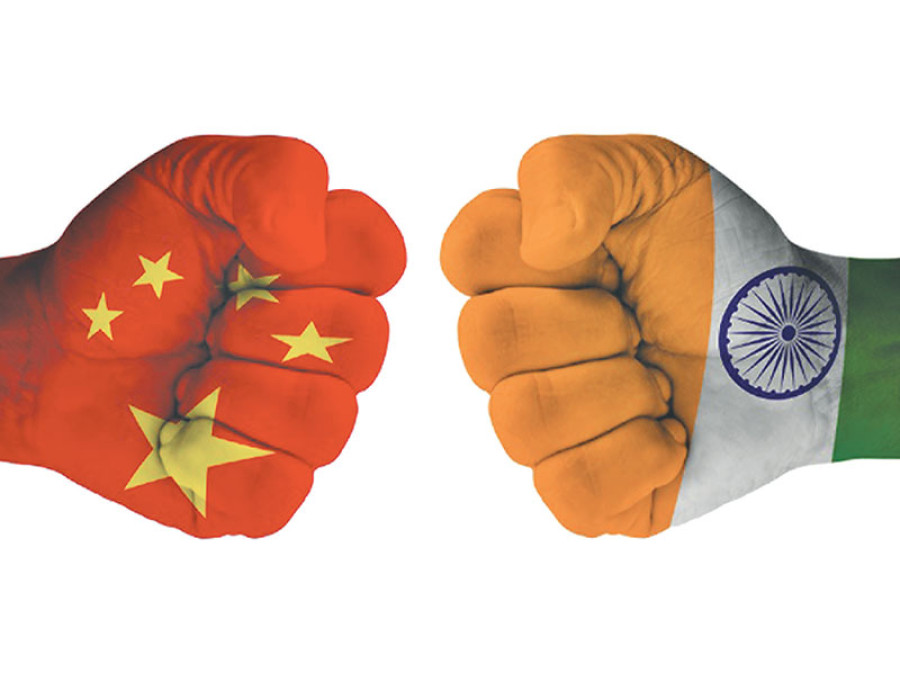Opinion
Doklam stand-off and Nepal
Last month, India sent troops to block China’s efforts to build a road on the Doklam plateau. Currently regarded as Chinese territory, the Doklam plateau has also been claimed by Bhutan.
Jainendra Jeevan
Last month, India sent troops to block China’s efforts to build a road on the Doklam plateau. Currently regarded as Chinese territory, the Doklam plateau has also been claimed by Bhutan. With guns pointed at each other in the areas surrounding the disputed territory, the two Asian giants are also intensifying their media campaigns against one another. A border war of limited time and place cannot be ruled out.
Meanwhile, Bhutan—a key stakeholder—has maintained a low-key posture in regard to the whole affair. Bhutan’s media have made little mention of Doklam, with only a single official statement issued on July 29. In the statement, Bhutan’s Foreign Ministry requested that China maintain a status quo ante in their border dispute and reminded the Chinese that the road construction has violated the written agreement of 1998 signed between the two governments. This suggests that Bhutan did not ask India to intervene; New Delhi sent troops to Doklam of its own volition.
India’s miscalculations
India regards Bhutan as being under its sphere of influence, if not a protectorate state as it was in the past. This is why New Delhi finds the prospect of Bhutan developing closer ties with China unacceptable. India has taken a strong stance against the quiet Sino-Bhutanese diplomacy and Chinese muscle-flexing in that particular area. China and Bhutan have been discussing the fate of Doklam plateau since as far back as the 1980s. China is understood to have offered Bhutan a small portion of the Doklam plateau in exchange for Bhutan’s withdrawal of claims to other disputed territories that cover over nearly 500sqkm in the north—the Pasamlung and Jakarlung valleys.
Jigme Thinley, Bhutan’s first elected prime minister who tried to pursue a more independent foreign policy, came close to making a deal with China along these lines. However, this raised Indian ire. Doklam is closer to India’s border—particularly a narrow passage of land dubbed the ‘chicken’s neck’ that connects India’s restive north-eastern region to the rest of the country—than the valleys in the north. New Delhi therefore perceived the possible agreement between Bhutan and China as a security threat and, in reaction, imposed a blockade on Bhutan. This resulted in the defeat of Thinley’s party in the following elections, and the new government led by a pro-Indian prime minister, Tsering Tobgay, shelved the Chinese offer.
Confronted by a tough Chinese response that includes a threat of war, New Delhi is now trying to save face and come to an arrangement so it can withdraw its troops. Ajit Doval, national security advisor to prime minister Narendra Modi who is also understood to be the mastermind behind the Doklam misadventure, is in Beijing for talks. In public, however, India has proposed that both sides withdraw their troops from the disputed area as a pre-condition for dialogues. China has been insisting on unconditional withdrawal of Indian troops and has rejected this offer. India’s military is no match for China’s, despite the fact that it has improved tremendously since the 1962 Sino-Indian war in which it suffered a humiliating defeat. And Indian leaders and policymakers know it very well.
False alarm in Nepal
Here in Nepal, Doklam has been a popular topic of discussion. A number of cases have been made via the media to emphasise that Nepal should play an active role in this dispute. Some are of the opinion that Prime Minister Sher Bahadur Deuba’s forthcoming visit to India should be cancelled or postponed until the Doklam stand-off is settled. And some opine that Nepal should be prepared for any eventuality. Some parliamentarians have even expressed their concerns in the House and demanded that the position of the government on this issue be made public.
Such reactions and responses are simply not warranted. We are not stakeholders in this affair and are not directly connected to it. Should war break out, it will be far away from our borders and even farther from our major trade and transit routes. Any impact on us will be indirect. Should we issue statements that ‘appeal to both sides to show restraint’ or ‘request to solve the dispute through dialogues’? Neither of the two Asian giants will take the advice of a small and weak buffer state such as ours seriously. Therefore, it is wiser to keep mum, as any statement, however balanced, may land us in unforeseen controversies. Both China and India are too powerful for us to play referee, let alone antagonise. During the 1962 Sino-Indian war, our leadership successfully maintained a neutral stance and refrained from making any imbalanced or controversial statements. That’s the wise thing to do this time as well.
And who spoke for us when Bhutan exiled 100,000 of its citizens just because they were of Nepali descent, and tried to systematically eliminate Nepali language and culture from its soil? While India colluded with Bhutan, China remained a silent spectator. Why and for whom should we, therefore, speak? Yes, there are times when we must speak, but only when the issue concerns us. If such a situation occurs tomorrow in Lipulek—Nepali territory claimed and occupied by India and recognised by China as such—we must voice our concerns and objections. But in regard to the situation on the Doklam plateau, we should stay informed, updated and prepared so that we can keep our supply lines unaffected, but should refrain from getting involved. We have enough of our own problems; adding one more in the name of Doklam is imprudent.




 14.24°C Kathmandu
14.24°C Kathmandu











